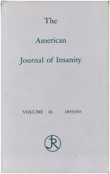DSM-IV field trial: obsessive-compulsive disorder [published erratum appears in Am J Psychiatry 1995 Apr;152(4):654]
Abstract
OBJECTIVE: Three issues relevant to revising the DSM-III-R criteria for obsessive-compulsive disorder were examined in a field trial: 1) the requirement that symptoms of obsessive-compulsive disorder be viewed by the patient as excessive or unreasonable, 2) the presence of mental compulsions in addition to behavioral compulsions, and 3) ICD-10 subcategories. METHOD: The authors studied symptom patterns of obsessive-compulsive disorder as well as strength of obsessive belief among 431 patients with obsessive-compulsive disorder at seven hospital outpatient clinics. Two methods of subject selection were used: consecutive entry of everyone who contacted the clinics for evaluation of obsessive-compulsive disorder and entry of patients with obsessive- compulsive disorder who had continuing contact with the clinics since before the field trial and who were still symptomatic. Primary measures were the Yale-Brown Obsessive Compulsive Scale and face-valid questions about fixity of obsessive-compulsive beliefs. RESULTS: The large majority of patients were uncertain about whether their obsessive- compulsive symptoms were unreasonable or excessive, and most had both mental and behavioral compulsions. Results on the ICD-10 subcategories were equivocal. CONCLUSIONS: The present results converge with previous findings to indicate a broad range of insight among patients with obsessive-compulsive disorder. The DSM-III-R requirement for insight should be de-emphasized in DSM-IV, and mental rituals should be included in the definition of compulsions.
Access content
To read the fulltext, please use one of the options below to sign in or purchase access.- Personal login
- Institutional Login
- Sign in via OpenAthens
- Register for access
-
Please login/register if you wish to pair your device and check access availability.
Not a subscriber?
PsychiatryOnline subscription options offer access to the DSM-5 library, books, journals, CME, and patient resources. This all-in-one virtual library provides psychiatrists and mental health professionals with key resources for diagnosis, treatment, research, and professional development.
Need more help? PsychiatryOnline Customer Service may be reached by emailing [email protected] or by calling 800-368-5777 (in the U.S.) or 703-907-7322 (outside the U.S.).



